100+ Sentence Starters To Help You Write Better and Smarter (Practice Writing with a Custom Chatbot!)
Ausbert Generoso
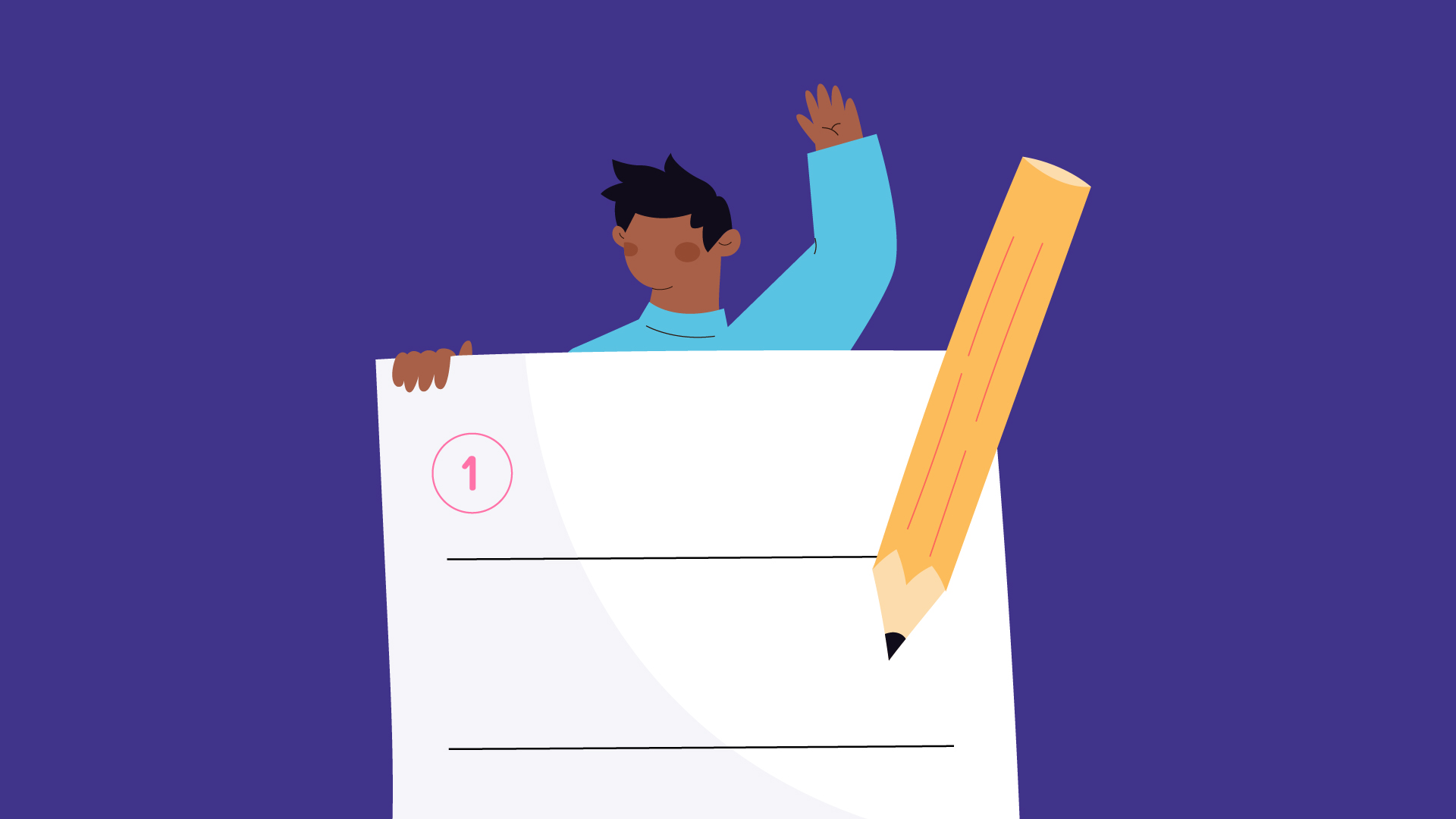

Introduction
When you start writing, the first words you choose can shape everything that follows. Yet, we often overlook the power of these very first words. In writing, it is important to acknowledge that solid sentence starters hook the reader and build the momentum you need to keep them engaged.
Sentence starters might seem like a small detail, but they truly form important part of compelling writing. They help you find your rhythm, guide your reader, and create seamless transitions between ideas. In short, they’re the keys to keeping your writing fluid and focused. Let’s break down why these small beginnings matter so much.
Why Are Sentence Starters Important?
A strong sentence starter can be the difference between captivating your audience and losing their attention. They bring rhythm, helping your writing flow naturally while guiding your reader along. Here’s why they play a crucial role:
- They set expectations. Starting with intention gives your audience a preview of what’s coming, whether it’s an idea, a question, or a vivid description.
- They help combat writer’s block. Sometimes, the hardest part is starting. A well-chosen sentence starter can spark creativity and break the barrier of hesitation.
- They make transitions smoother. Great sentence starters guide readers through your thoughts without abrupt stops, making your writing feel cohesive and connected.
- They anchor your voice. The way you start a sentence reflects your tone, personality, and purpose, keeping your writing consistent and authentic.
- They keep the reader hooked. A strong opening to any sentence builds curiosity, setting the pace for a narrative, argument, or description.
How to Write Good Sentence Starters
Crafting good sentence starters can also mean feeling your words as they unfold. Here’s how you can break out of the ordinary and create something impactful:
- Talk or write to yourself. You’d be surprised how verbalizing or jotting down your thoughts forces clarity and reveals what’s truly worth saying.
- Start somewhere ridiculous. Begin with a bizarre phrase or idea, then reel it in. You might end up with the most unique way to set up your point.
- Channel your inner poet. Even if you’re writing a report, think about rhythm and flow. A lyrical starter can elevate even the most mundane topics.
- Imagine you’re writing to one person. Instead of writing for “an audience,” visualize a specific person. This makes your starter more personal and relatable.
Start Strong with These 100+ Sentence Starters in 9 Different Categories
Introductory sentence starters.
Starting off strong sets the tone for your writing. Whether you’re crafting an essay, delivering a speech, or even drafting an email, the right opening can grab attention and guide your audience into the heart of your message.
- To begin with,
- Let’s start by considering…
- In this discussion,
- The purpose of this essay is to…
- At the outset, it is important to note…
- In exploring this topic,
- Before delving into the details,
- To set the stage,
- It is widely acknowledged that…
- Starting with the basics,
- To provide some context,
- Let’s take a moment to reflect on…
Narrative Sentence Starters
Telling a story is all about creating an experience for your audience. The right narrative sentence starter can pull readers into your world, set the scene, and build intrigue. From quiet beginnings to sudden twists, these starters give your story the momentum it needs to keep your audience hooked.
- Once upon a time,
- As the day began,
- In the blink of an eye,
- Little did they know,
- With a deep breath,
- As the clock struck midnight,
- In the midst of chaos,
- Just as the sun dipped below the horizon,
- Long before anyone could imagine,
- In a small, quiet town,
- Suddenly, everything changed when…
- With trembling hands,
- Amid the laughter,
- It all began on a crisp autumn morning.
Opinion/Argumentative Sentence Starters
When you’re presenting your opinions or building an argument, how you begin is crucial. A strong sentence starter not only conveys confidence but also prepares your audience for a well-supported viewpoint. These examples are perfect for essays, debates, and any writing where you need to persuade or share your perspective.
- I strongly believe that…
- From my perspective,
- It is undeniable that…
- One could argue that…
- In my opinion,
- Based on the evidence,
- I am convinced that…
- Many would agree that…
- It seems clear to me that…
- The most logical explanation is…
- Personally, I think…
- This brings me to the conclusion that…
- The facts clearly show that…
Descriptive Sentence Starters
Descriptions are the backbone of vivid writing. They bring scenes to life and immerse readers in the world you’re creating. These descriptive sentence starters will help you add depth, color, and texture to your writing, ensuring your audience can see, hear, and feel every detail.
- The air was thick with…
- Beneath the shimmering stars,
- The golden light of dawn cast…
- With every step, the ground seemed to…
- A faint aroma of…
- Hidden behind the towering trees,
- The room was filled with…
- Along the winding path,
- The gentle rustle of leaves signaled…
- In the distance, the sound of…
- A sudden burst of color lit up the…
- The landscape stretched endlessly, dotted with…
- Shadows danced across the walls as…
- The icy chill of the wind bit at…
- Under the blazing sun,
Explanatory Sentence Starters
Clarity is key when explaining ideas or concepts. The right explanatory sentence starter can help break down complex thoughts into digestible pieces, ensuring your audience stays engaged and informed. Use these starters to make your writing more accessible and easy to follow.
- This means that…
- In other words,
- To put it simply,
- For example,
- To clarify,
- This can be explained by…
- What this suggests is…
- To illustrate this point,
- Specifically,
- This happens because…
- In essence,
Comparative Sentence Starters
Comparison is a powerful way to highlight similarities and differences. Whether you’re analyzing literature, exploring options, or debating topics, these comparative sentence starters help you smoothly transition into a balanced and insightful discussion.
- In the same way,
- Just like…,
- Compared to…,
- In contrast,
- On the other hand,
- While both share similarities,
- One key difference is that…
Convincing Sentence Starters
Convincing your audience requires a compelling beginning. These sentence starters are designed to engage emotions, provoke thought, and encourage your audience to see things from your perspective. Use them to build a strong case and inspire action.
- Imagine a world where…
- You must agree that…
- It’s hard to deny that…
- Have you ever considered…
- What if I told you that…
- Surely, it’s clear that…
- Let’s take a moment to think about…
- Now, picture this…
- The evidence strongly suggests that…
- Isn’t it obvious that…
- This is why it’s crucial to…
- You can’t overlook the fact that…
- It stands to reason that…
Persuasive Sentence Starters
Persuasion is an art, and the way you open a statement can set the tone for the entire argument. These persuasive sentence starters are crafted to grab attention, appeal to logic or emotion, and motivate your audience to act or agree with your stance.
- Imagine how much better life could be if…
- You owe it to yourself to…
- Don’t you think it’s time to…
- The time has come to…
- Isn’t it worth considering…
- You have the power to…
- Think about the benefits of…
- Let me show you why…
- By taking this step, you can…
- What’s stopping you from…
- Believe me when I say…
- It’s now or never; you should…
- Let’s work together to…
- This is your chance to…
Concluding Sentence Starters
A strong conclusion leaves a lasting impression. It ties together your points and reinforces your message, making sure your audience remembers what you’ve said. These concluding sentence starters will help you end your writing on a high note, with clarity and confidence.
- In conclusion,
- To summarize,
- As you can see,
- Ultimately,
- In the end,
- To wrap things up,
- On the whole,
- As a final thought,
- Taking everything into account,
- With this in mind,
- To bring it all together,
- In light of these points,
Practice Writing Good Sentence Starters with a Custom Edcafe AI Chatbot
Sometimes, the hardest part of writing is getting started. But don’t fret! With this Edcafe AI-created custom chatbot, you can practice creating strong, engaging sentence starters in real time. This chatbot is designed specifically to help you with:
- Sentence Starters: This chatbot can give you the beginning of a sentence, and you can complete it with your own words.
- Writing Prompts: It can suggest topics or scenarios for you to write about.
- Feedback: If you write something, it can help you refine it or suggest improvements.
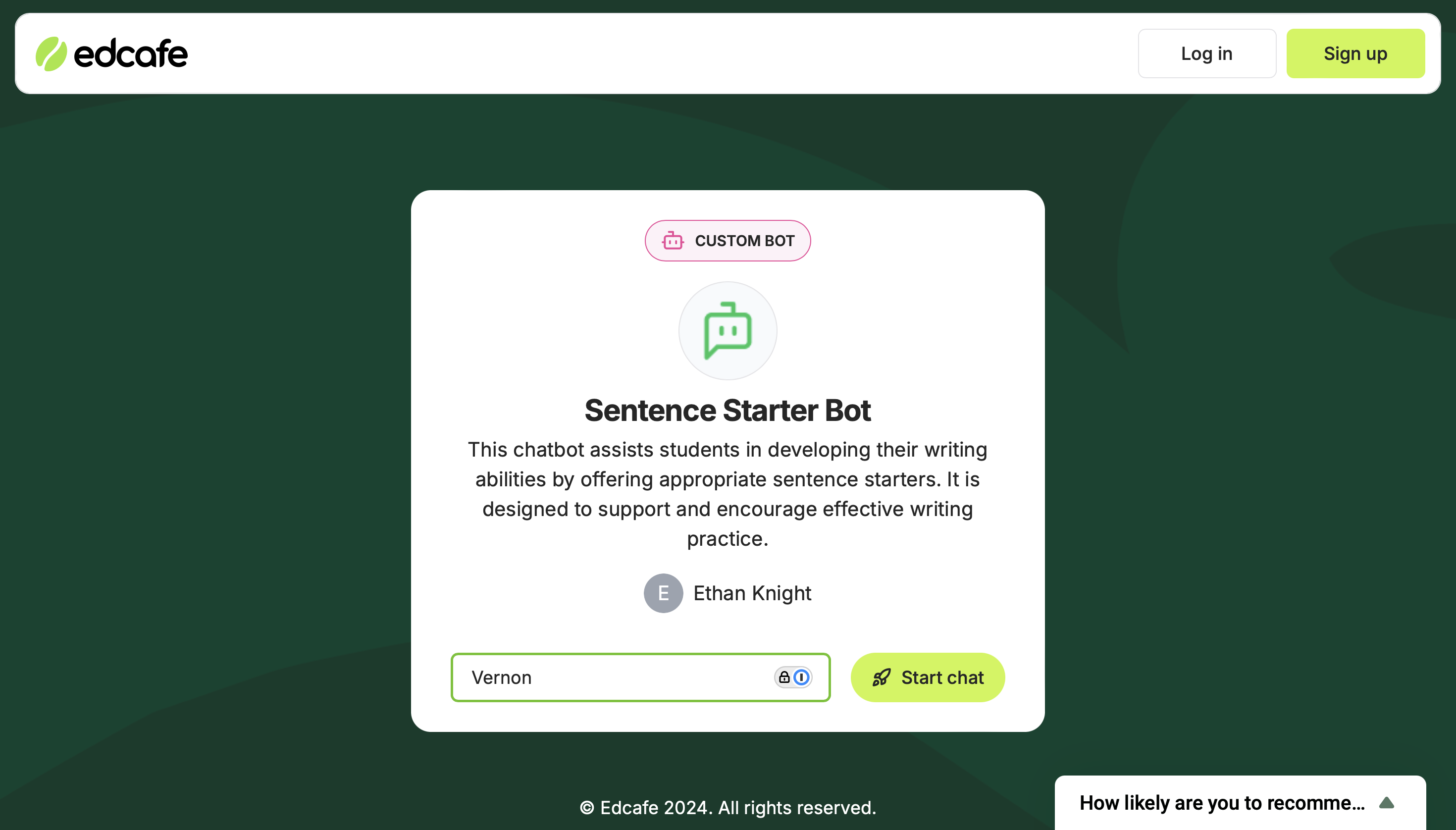
You can ask anything, much like a personal ChatGPT, but with a focus on guiding you to write effective and engaging sentence starters.
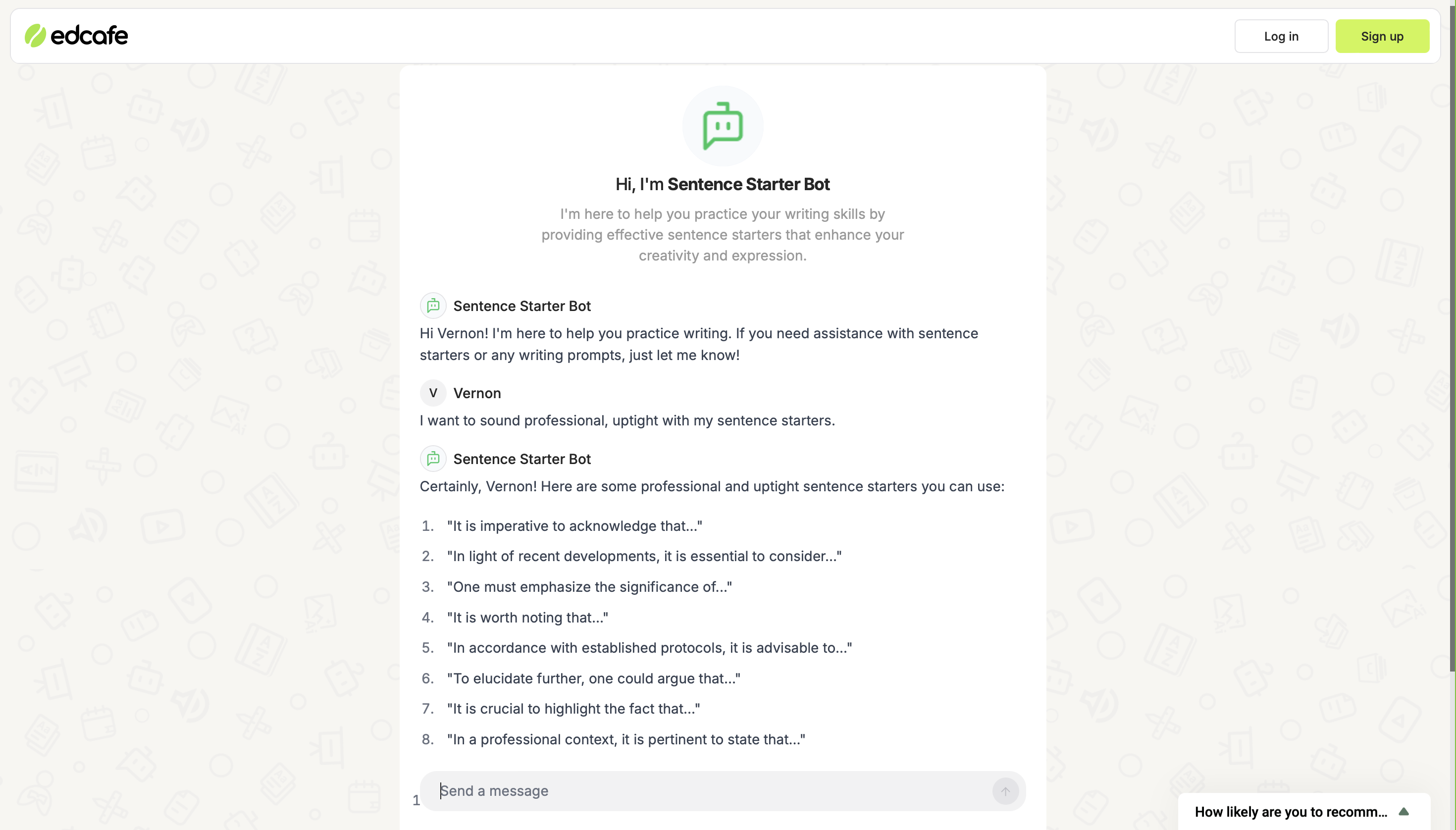
If you’re a teacher , you can make use of Edcafe AI to create custom chatbots tailored to your specific teaching needs. This includes a chatbot specifically designed to guide students in writing strong sentence starters, among many other content generation tools for instructional planning, material creation, and assessments.
Just click on the Clone button,
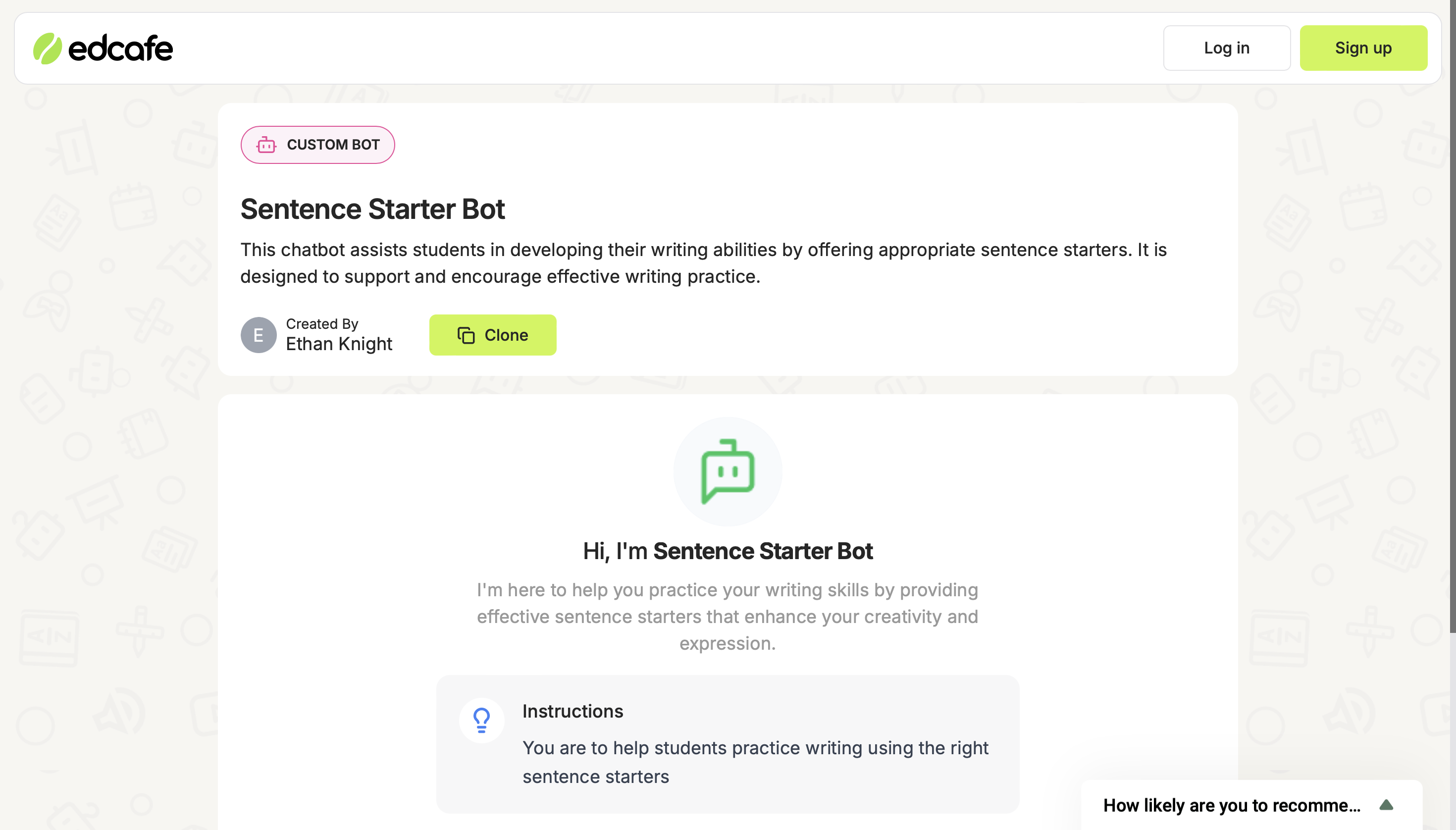
and opt to login (if you have an account) or sign up for free! Edcafe AI’s Custom Chatbot feature is available at no cost, so feel free to explore!
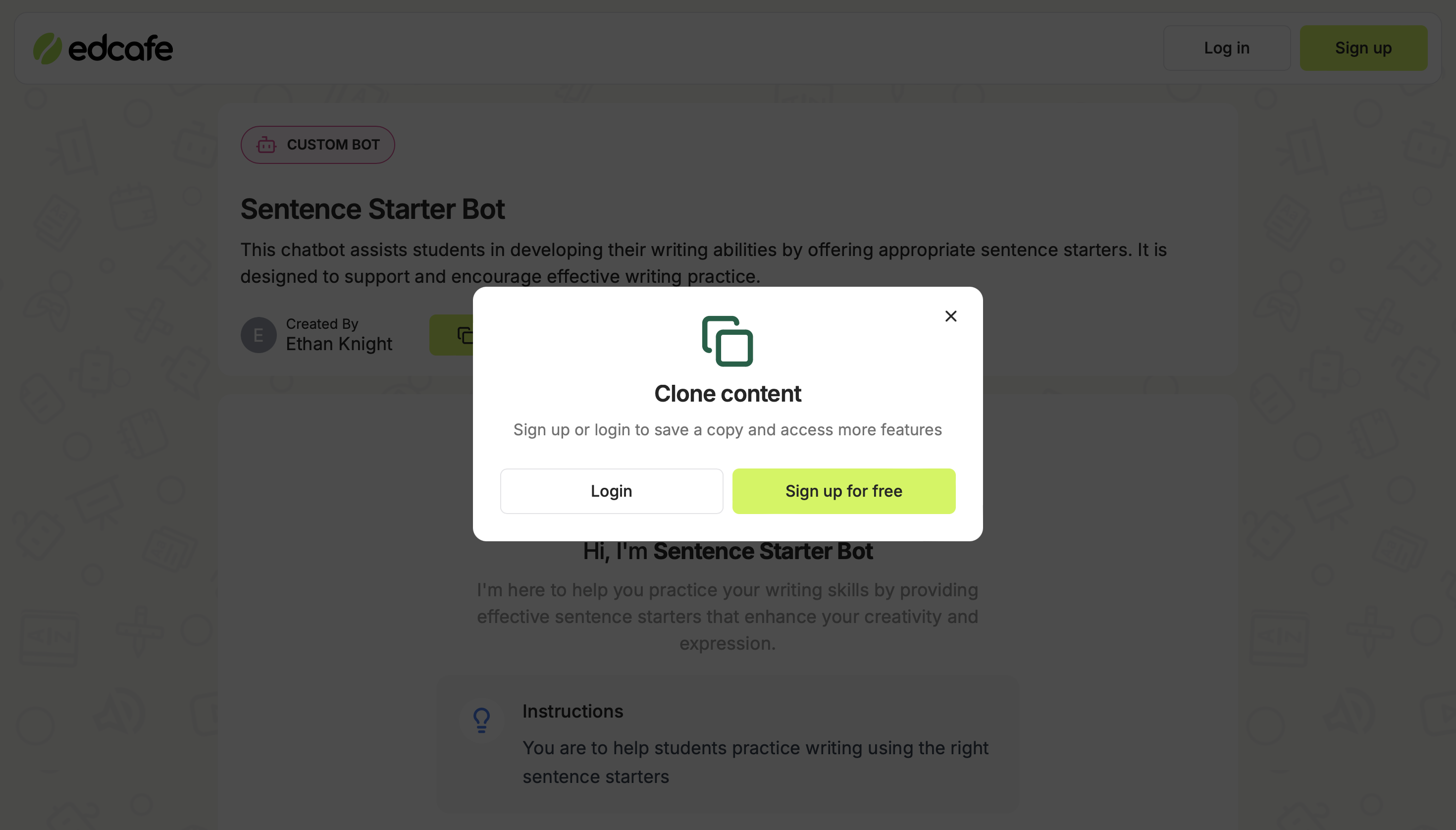
Start creating teaching content in seconds, including custom chatbots, with Edcafe AI. Sign up for a forever free account today.
More Reads For You
8 Powerful Reading Comprehension Strategies to Help Students Excel in Reading
70 Thought-Provoking Debate Topics for Students in Different Categories That Cover the Most Important Issues of Our Time
The Best 260+ Get to Know You Questions for Students to Build Classroom Connections (Downloadable PowerPoint Template Available!)
120 Fun Never Have I Ever Questions for Classroom Icebreakers (Free Playable Template Available!)
About Ausbert Generoso
Supercharge your powerpoint. start today..
800,000+ people like you use ClassPoint to boost student engagement in PowerPoint presentations.
Sentence Starters: Ultimate List to Improve Your Essays and Writing

By Ashley Shaw
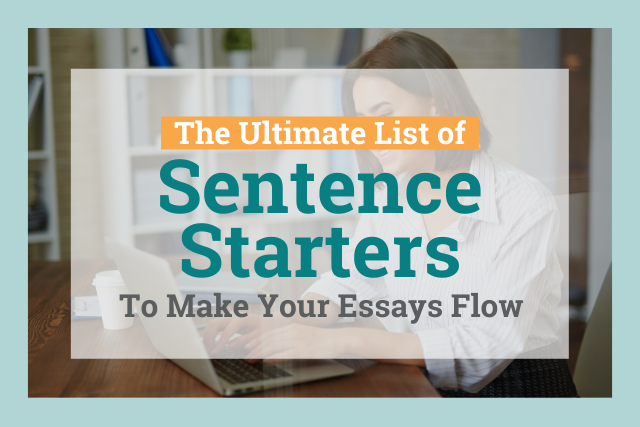
This blog post is going to be about … No. Too boring.
Today, I am going to talk to you about ... No. Too specific.
This is a blog post for all writers ... Nope. Too generic.
Has this ever been you while writing? I get it. Writing a good sentence can be hard, and when you have to string a whole lot of them together, the task can become daunting. So what do you do?
From the first sentence you write to the very last, you want each one to show your style and motivate your reader to keep reading. In this post, we are going to think about how you start your sentences.
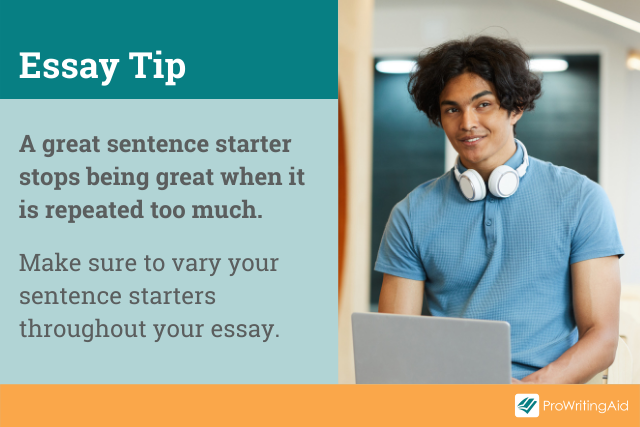
What Is a Good Sentence Starter for an Essay Introduction?
What is a good sentence starter for a body paragraph, 25 useful transitions, can i repeat a sentence starter, how can i rephrase "in conclusion".
The first paragraph of a paper can make or break your grade. It is what gets your audience into the topic and sets the whole stage. Because of this, it is important to get your readers hooked early.
The first sentence of a paper is often called the hook. It shouldn’t be anything ordinary. It should have strong language and be a little surprising, with an interesting fact, story, statistic, or quote on the topic.
Because it is designed to pull the reader in and surprise them a little, it is often good to avoid pre-written sentence starter examples when writing your hook. Just get into it here, and worry about the flow later.
Here are some examples:
Spider webs were once used as bandages.
I taught myself to read when I was three. At least, that’s the story my parents tell.
Recent studies suggest that the average person lies at least once in every conversation.
“The world is bleeding and humans wield the knife,” or so says environmental scientist So Andso.
(P.S. Except for example 1, which is true, I just made all of these up to demonstrate my point. So, please don’t quote me on these!)
Once you jump right in with your hook, it is time to start working on ways to move sentences along. Here is where you may need some sentence starter examples.
In your first paragraph, you basically want to connect your hook to your thesis. You’ll do this with a few sentences setting up the stage for your topic and the claim you will make about it. To do that, follow the tips found in the next section on body paragraphs and general sentence starter tips.
Many of the tips I am about to discuss can be used anywhere in a paper, but they are especially helpful when writing body paragraphs.
Let’s start with one of the most important types of sentence starter in essay writing: transition words.
How Do I Use Transitions in an Essay?
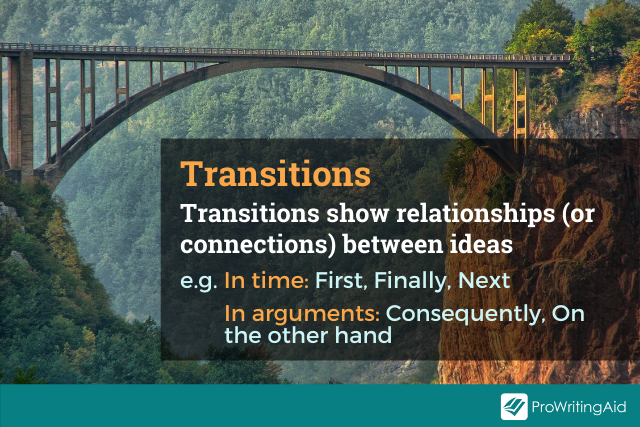
If you want to start writing terrific sentences (and improve your essay structure ), the first thing you should do is start using transition words.
Transition words are those words or phrases that help connect thoughts and ideas. They move one sentence or paragraph into another, and they make things feel less abrupt.
The good thing about transition words is that you probably know a lot of them already and currently use them in your speech. Now, you just need to transition them into your writing. (See what I did there?)
Before we get into examples of what a good transition word is, let’s look at a paragraph without any transitions:
I went to the store. I bought bacon and eggs. I saw someone I knew. I said hello. I went to the cashier. They checked me out. I paid. I got my groceries. I went to my car. I returned home.
Yikes! That is some boring writing. It was painful to write, and I am sure it is even worse to read. There are two reasons for this:
- I start every sentence with the same word (more on this later)
- There are no signposts showing me how the ideas in the paragraph connect.
In an essay, you need to show how each of your ideas relate to each other to build your argument. If you just make a series of statements one after the other, you’re not showing your instructor that you actually understand those statements, or your topic.
How do we fix this? Transition words. Roughly 25% of your sentences should start with a transition word. If you can hit that number in your essay, you’ll know that you’ve made meaningful steps towards demonstrating your understanding.
Of course, hitting that number isn’t enough—those transitions need to be meaningful. Let’s look at the different types of transitions and how you can use them.
What Are Words Like First , Next , and Last Called?
You probably already use some transitions in your essays. For example, if you start a paragraph with firstly , you’ve used a transition word. But transitions can do so much more!
Here are 25 common transitional words and phrases that you could use in your essay:
- Additionally / In Addition
- Alternatively / Conversely
- As a result of
- At this time
- Consequently
- Contrary to
- First(ly), Second(ly), etc.
- In contrast
- Nonetheless
- On the other hand
- Particularly / In particular
- In other words
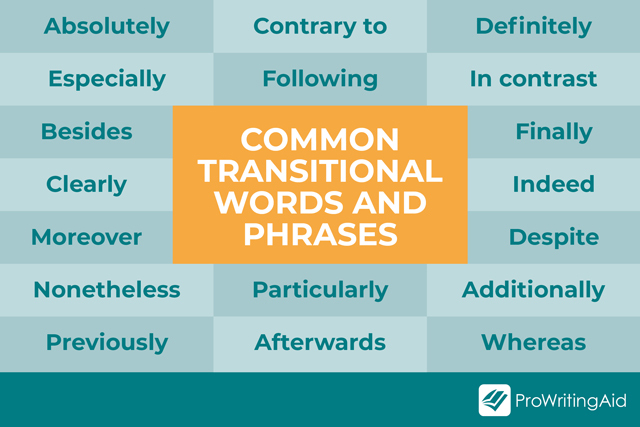
This list isn’t exhaustive, but it is a good start.
These words show different types of relationships between ideas. These relationships fall into four main categories: Emphasis , Contrast , Addition , and Order .
What Are Emphasis Transition Words?
These phrases are used when you want to highlight a point. Examples from my above list include clearly , particularly , and indeed . Want to see some more? Follow my bolded transitions: Undoubtedly , you understand now. It should be noted that you don’t need to worry.
How Do You Use Addition Transitions?
These words add on to what you just said. These are words like along with , moreover , and also . Here are some more: Not only are you going to be great at transitions after this, but you will also be good at writing sentences. Furthermore , everyone is excited to see what you have to say.
How Can I Use Transitions to Contrast Ideas?
This is the opposite of addition, and you use it when you want to show an alternative view or to compare things. Examples from my list include words like nonetheless , contrary to , and besides .
Here are some more: Unlike people who haven’t read this article, you are going to be really prepared to write great sentences. Even so , there is still a lot more about writing to learn.
How Do I Order Ideas in My Essay?
A good first step is using order transition words.
This set of transitions helps mark the passage of time or gives an order to events. From the list, think of things like first and finally . Now for some extras: At this time yesterday , you were worried about starting sentences. Following this , though, you will be an expert.
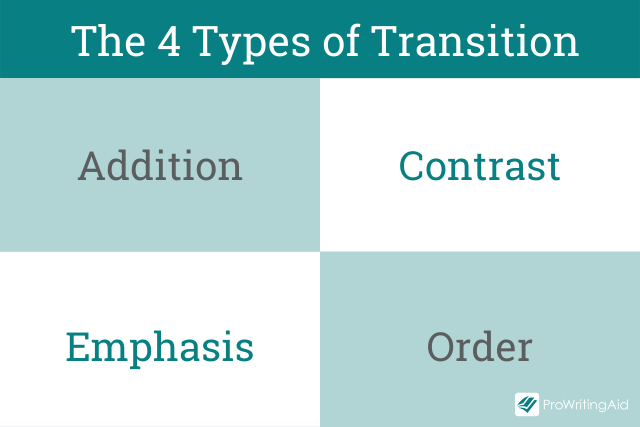
Now that you get the concept of transitions, let’s go back to that poorly written paragraph above and add some in to see what happens:
This morning , I went to the store. While I was there, I bought bacon and eggs. Then I saw someone I knew. So I said hello. After that , I went to the cashier. At that time , they checked me out. First , I paid. Next , I got my groceries. Following that , I went to my car. Finally , I returned home.
(Notice the use of commas after most of these transitions!)
This isn’t the best paragraph I’ve ever written. It still needs a lot of work. However, notice what a difference just adding transitions makes. This is something simple but effective you can start doing to make your sentences better today.
If you want to check your transition usage, try ProWritingAid’s Transitions report . You’ll see how many of each type of transition word you've used so you can pin-point where you might be losing your reader.
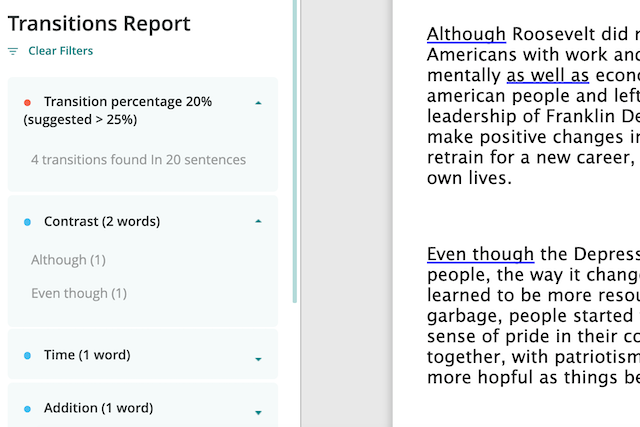
Sign up for a free ProWritingAid account to try it out.
What Are Some Linking Phrases I Can Use in My Essay?
As well as individual words, you can also use short phrases at the beginning of your sentences to transition between ideas. I just did it there— "As well as individual words" shows you how this section of the article is related to the last.
Here are some more phrases like this:
As shown in the example,
As a result of this,
After the meeting,
While this may be true,
Though researchers suggest X,
Before the war began,
Until we answer this question,
Since we cannot assume this to be true,
While some may claim Y,
Because we know that Z is true,
These short phrases are called dependent clauses . See how they all end with a comma? That's because they need you to add more information to make them into complete sentences.
- While some may claim that chocolate is bad for you, data from a recent study suggests that it may have untapped health benefits .
- Since we cannot assume that test conditions were consistent, it is impossible to reach a solid conclusion via this experiment .
- As a result of this, critics disagree as to the symbolism of the yellow car in The Great Gatsby .
The bolded text in each example could stand on its own as a complete sentence. However, if we take away the first part of each sentence, we lose our connection to the other ideas in the essay.
These phrases are called dependent clauses : they depend on you adding another statement to the sentence to complete them. When you use a sentence starter phrase like the ones above in your writing, you signal that the new idea you have introduced completes (or disrupts) the idea before it.
Note: While some very short dependent clauses don’t need a comma, most do. Since it is not wrong to use one on even short ones (depending on the style guide being used), it is a good idea to include one every time.
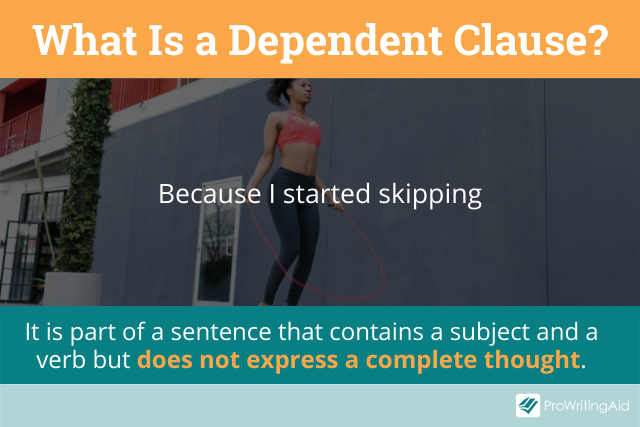
Along with missing transitions and repeating sentence structure, another thing that stops sentences from being great is too much repetition. Keep your sentences sharp and poignant by mixing up word choices to start your sentences.
You might start your sentence with a great word, but then you use that same word 17 sentences in a row. After the first couple, your sentences don’t sound as great. So, whether it is varying the transitional phrases you use or just mixing up the sentence openers in general, putting in some variety will only improve your sentences.
ProWritingAid lets you know if you’ve used the same word repeatedly at the start of your sentences so you can change it.
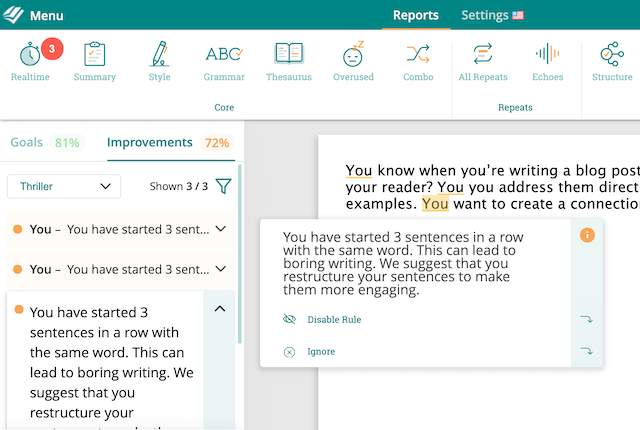
The Repeats Report also shows you all of the repeats in your document. If you've used a sentence starter and then repeated it a couple of paragraphs down, the report will highlight it for you.
Try the Repeats Report with a free ProWritingAid account.
Now that you have your introduction sentences and body sentences taken care of, let’s talk a little about conclusion sentences. While you will still use transitions and clauses as in the body, there are some special considerations here.
Your conclusion is what people will remember most after they finish reading your paper. So, you want to make it stand out. Don’t just repeat yourself; tell them what they should do with what you just told them!
Use the tips from above, but also remember the following:
Be unique. Not only should you vary the words you use to start different sentences, but you should also think outside of the box. If you use the same conclusion sentence starter everyone else is using, your ideas will blend in too.
Be natural. Some of the best writing out there is writing that sounds natural. This goes for academic writing, too. While you won’t use phrases like "at the end of the day" in essay writing, stilted phrases like "in conclusion" can disrupt the flow you’ve created earlier on.
Here are some alternatives to "in conclusion" you could use in an essay:
- To review, ... (best for scientific papers where you need to restate your key points before making your final statement)
- As has been shown, ...
- In the final analysis, ...
- Taking everything into account, ...
- On the whole, ...
- Generally speaking, ...
If you’re looking for more ways to rephrase "in conclusion," take a look at our complete list of synonyms you can use.
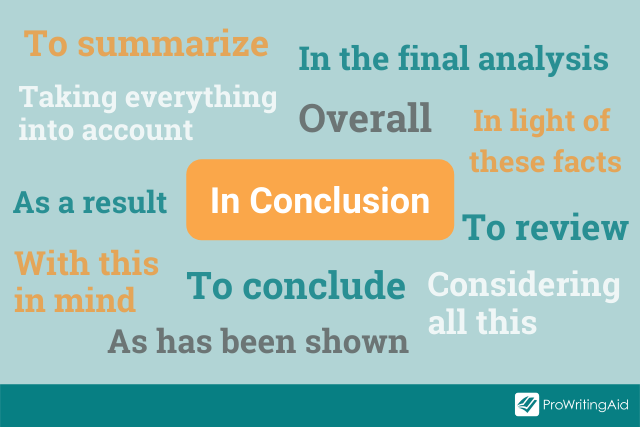
There may not be a set word or words that you can use to make your sentences perfect. However, when you start using these tips, you’ll start to see noticeable improvement in your writing.
If you’ve ever heard people talk about pacing and flow in academic writing, and you have no idea what they mean or how to improve yours, then this is your answer. These tips will help your writing sound more natural, which is how you help your ideas flow.
Take your writing to the next level:

20 Editing Tips from Professional Writers
Whether you are writing a novel, essay, article, or email, good writing is an essential part of communicating your ideas., this guide contains the 20 most important writing tips and techniques from a wide range of professional writers..

Be confident about grammar
Check every email, essay, or story for grammar mistakes. Fix them before you press send.
Ashley Shaw
Ashley Shaw is a former editor and marketer/current PhD student and teacher. When she isn't studying con artists for her dissertation, she's thinking of new ways to help college students better understand and love the writing process.
Get started with ProWritingAid
Visit our Help Center or let's stay in touch via:
105 Best Words To Start A Paragraph

Chris Drew (PhD)
Dr. Chris Drew is the founder of the Helpful Professor. He holds a PhD in education and has published over 20 articles in scholarly journals. He is the former editor of the Journal of Learning Development in Higher Education. [Image Descriptor: Photo of Chris]
Learn about our Editorial Process
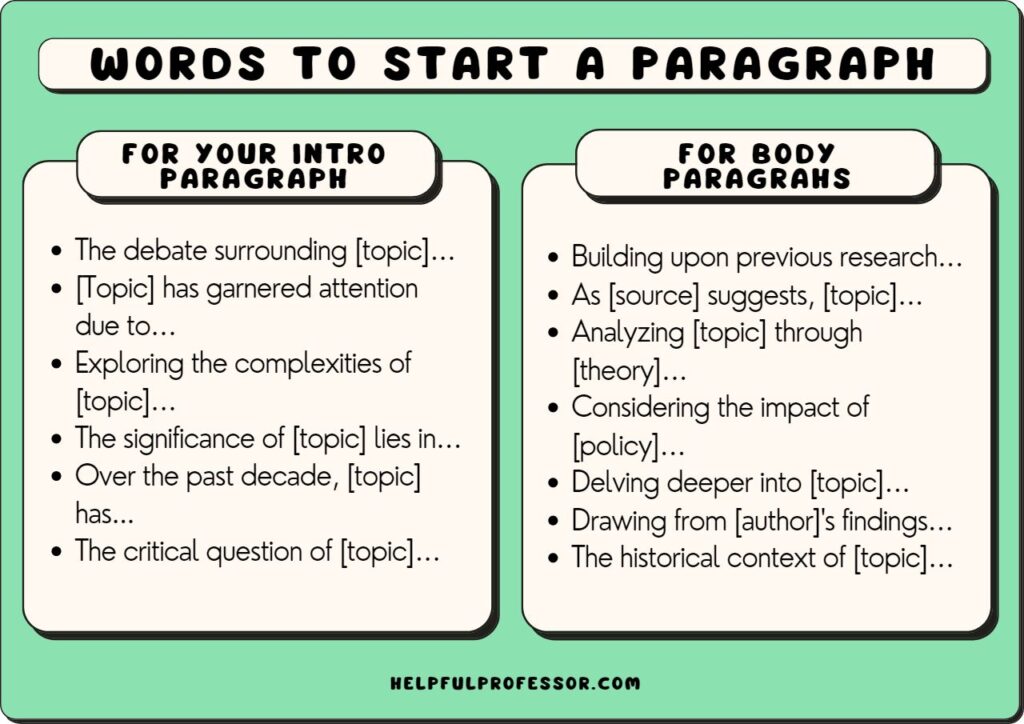
The first words of a paragraph are crucial as they set the tone and inform the reader about the content that follows.
Known as the ‘topic’ sentence, the first sentence of the paragraph should clearly convey the paragraph’s main idea.
This article presents a comprehensive list of the best words to start a paragraph, be it the first, second, third, or concluding paragraph.
Words to Start an Introduction Paragraph
The words you choose for starting an essay should establish the context, importance, or conflict of your topic.
The purpose of an introduction is to provide the reader with a clear understanding of the topic, its significance, and the structure of the ensuing discussion or argument.
Students often struggle to think of ways to start introductions because they may feel overwhelmed by the need to effectively summarize and contextualize their topic, capture the reader’s interest, and provide a roadmap for the rest of the paper, all while trying to create a strong first impression.
Choose one of these example words to start an introduction to get yourself started:
- The debate surrounding [topic]…
- [Topic] has garnered attention due to…
- Exploring the complexities of [topic]…
- The significance of [topic] lies in…
- Over the past decade, [topic] has…
- The critical question of [topic]…
- As society grapples with [topic]…
- The rapidly evolving landscape of [topic]…
- A closer examination of [topic] reveals…
- The ongoing conversation around [topic]…
Don’t Miss my Article: 33 Words to Avoid in an Essay
Words to Start a Body Paragraph
The purpose of a body paragraph in an essay is to develop and support the main argument, presenting evidence, examples, and analysis that contribute to the overall thesis.
Students may struggle to think of ways to start body paragraphs because they need to find appropriate transition words or phrases that seamlessly connect the paragraphs, while also introducing a new idea or evidence that builds on the previous points.
This can be challenging, as students must carefully balance the need for continuity and logical flow with the introduction of fresh perspectives.
Try some of these paragraph starters if you’re stuck:
- Building upon previous research…
- As [source] suggests, [topic]…
- Analyzing [topic] through [theory]…
- Considering the impact of [policy]…
- Delving deeper into [topic]…
- Drawing from [author]’s findings…
- [Topic] intersects with [related topic]…
- Contrary to popular belief, [topic]…
- The historical context of [topic]…
- Addressing the challenges of [topic]…
Words to Start a Conclusion Paragraph
The conclusion paragraph wraps up your essay and leaves a lasting impression on the reader.
It should convincingly summarize your thesis and main points. For more tips on writing a compelling conclusion, consider the following examples of ways to say “in conclusion”:
- In summary, [topic] demonstrates…
- The evidence overwhelmingly suggests…
- Taking all factors into account…
- In light of the analysis, [topic]…
- Ultimately, [topic] plays a crucial role…
- In light of these findings…
- Weighing the pros and cons of [topic]…
- By synthesizing the key points…
- The interplay of factors in [topic]…
- [Topic] leaves us with important implications…
Complete List of Transition Words
Above, I’ve provided 30 different examples of phrases you can copy and paste to get started on your paragraphs.
Let’s finish strong with a comprehensive list of transition words you can mix and match to start any paragraph you want:
- Secondly, …
- In addition, …
- Furthermore, …
- Moreover, …
- On the other hand, …
- In contrast, …
- Conversely, …
- Despite this, …
- Nevertheless, …
- Although, …
- As a result, …
- Consequently, …
- Therefore, …
- Additionally, …
- Simultaneously, …
- Meanwhile, …
- In comparison, …
- Comparatively, …
- As previously mentioned, …
- For instance, …
- For example, …
- Specifically, …
- In particular, …
- Significantly, …
- Interestingly, …
- Surprisingly, …
- Importantly, …
- According to [source], …
- As [source] states, …
- As [source] suggests, …
- In the context of, …
- In light of, …
- Taking into consideration, …
- Given that, …
- Considering the fact that, …
- Bearing in mind, …
- To illustrate, …
- To demonstrate, …
- To clarify, …
- To put it simply, …
- In other words, …
- To reiterate, …
- As a matter of fact, …
- Undoubtedly, …
- Unquestionably, …
- Without a doubt, …
- It is worth noting that, …
- One could argue that, …
- It is essential to highlight, …
- It is important to emphasize, …
- It is crucial to mention, …
- When examining, …
- In terms of, …
- With regards to, …
- In relation to, …
- As a consequence, …
- As an illustration, …
- As evidence, …
- Based on [source], …
- Building upon, …
- By the same token, …
- In the same vein, …
- In support of this, …
- In line with, …
- To further support, …
- To substantiate, …
- To provide context, …
- To put this into perspective, …
Tip: Use Right-Branching Sentences to Start your Paragraphs
Sentences should have the key information front-loaded. This makes them easier to read. So, start your sentence with the key information!
To understand this, you need to understand two contrasting types of sentences:
- Left-branching sentences , also known as front-loaded sentences, begin with the main subject and verb, followed by modifiers, additional information, or clauses.
- Right-branching sentences , or back-loaded sentences, start with modifiers, introductory phrases, or clauses, leading to the main subject and verb later in the sentence.
In academic writing, left-branching or front-loaded sentences are generally considered easier to read and more authoritative.
This is because they present the core information—the subject and the verb—at the beginning, making it easier for readers to understand the main point of the sentence.
Front-loading also creates a clear and straightforward sentence structure, which is preferred in academic writing for its clarity and conciseness.
Right-branching or back-loaded sentences, with their more complex and sometimes convoluted structure, can be more challenging for readers to follow and may lead to confusion or misinterpretation.
Take these examples where I’ve highlighted the subject of the sentence in bold. Note that in the right-branching sentences, the topic is front-loaded.
- Right Branching: Researchers found a strong correlation between sleep and cognitive function after analyzing the data from various studies.
- Left-Branching: After analyzing the data from various studies, a strong correlation between sleep and cognitive function was found by researchers.
- The novel was filled with vivid imagery and thought-provoking themes , which captivated the audience from the very first chapter.
- Captivating the audience from the very first chapter, the novel was filled with vivid imagery and thought-provoking themes.
The words you choose to start a paragraph are crucial for setting the tone, establishing context, and ensuring a smooth flow throughout your essay.
By carefully selecting the best words for each type of paragraph, you can create a coherent, engaging, and persuasive piece of writing.

- Chris Drew (PhD) https://helpfulprofessor.com/author/chris-drew-phd-2/ 10 Reasons you’re Perpetually Single
- Chris Drew (PhD) https://helpfulprofessor.com/author/chris-drew-phd-2/ 20 Montessori Toddler Bedrooms (Design Inspiration)
- Chris Drew (PhD) https://helpfulprofessor.com/author/chris-drew-phd-2/ 21 Montessori Homeschool Setups
- Chris Drew (PhD) https://helpfulprofessor.com/author/chris-drew-phd-2/ 101 Hidden Talents Examples
Leave a Comment Cancel Reply
Your email address will not be published. Required fields are marked *

Sentence Starters: Useful Words and Phrases
Sentence Starters! When writing an essay in the English language , it is very important that your writing flows and sounds good. There are a variety of ways in which you can do this, one such way is by using sentence starters. In this article, we are going to be looking at some sentence starters which you can use as a way of creating much more interesting and engaging written work in English.
What Are Sentence Starters?
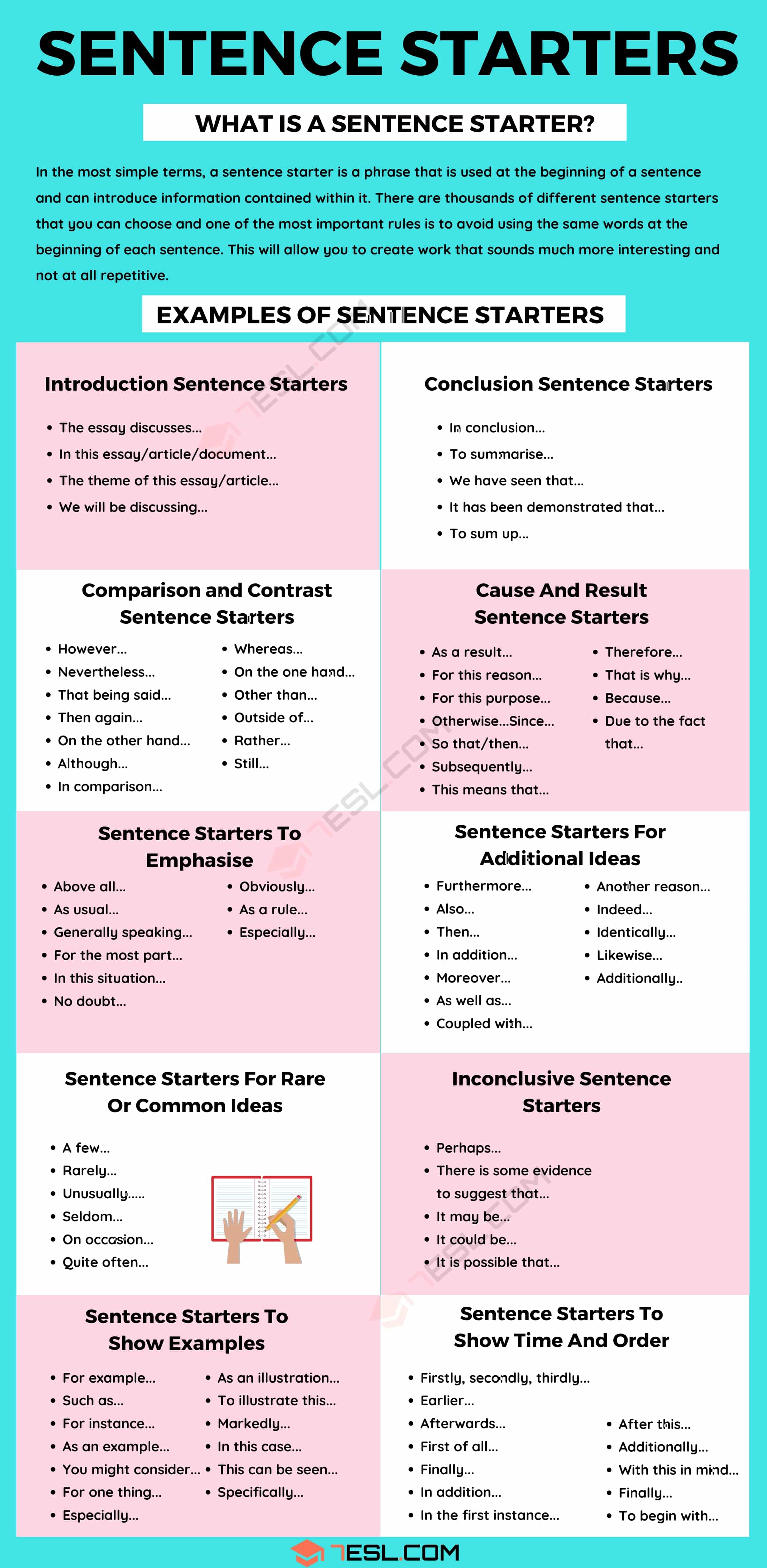
In the most simple terms, a sentence starter is a phrase that is used at the beginning of a sentence and can introduce information contained within it. There are thousands of different sentence starters that you can choose and one of the most important rules is to avoid using the same words at the beginning of each sentence. This will allow you to create work that sounds much more interesting and not at all repetitive . You can achieve this by using the extensive list of sentence starters whenever you are writing an essay or other sort of work in English.
There are various ways of using sentence starters, so before we begin looking at some examples we are going to take a look at some useful tips for getting the most out of your sentence starters.
- As we mentioned, avoid using the same word repeatedly at the start of multiple sentences.
- Think about what type of sentence you are writing. Is it an information sentence? Does it ask a question? Does the sentence compare or contrast existing information? Is the sentence putting something in order? Does it conclude something? By working out the type of sentence it is, you will be able to better decide on your sentence starter.
- You should also ask yourself how the sentence relates to the previous one. This will allow you to further choose a relevant sentence starter.
- Once you have finished writing your essay, or other pieces of writing, it is very important that you go over it and make any necessary edits and adjustments. This will help you to make the most of sentence starters and ensure that there is no repetition and that each sentence starter has been sued correctly. You should initially write without thinking too much about it and then make changes when you edit.
Examples Of Sentence Starters
As we mentioned, there are thousands of sentence starters that you can use when writing in English, we are now going to look at some of the most common and useful ones. We will do this by category to better help you select the right one.
Introduction Sentence Starters
If your sentence is being used to introduce some information, you can use one of the following sentence starters.
- The essay discusses…
- In this essay/article/document…
- The theme of this essay/article…
- We will be discussing…
Conclusion Sentence Starters
When writing a concluding sentence, you might consider one of the following options.
- In conclusion …
- To summarise…
- We have seen that…..
- It has been demonstrated that…
- To sum up…

Comparison and Contrast Sentence Starters
If you are writing a sentence to compare or contrast, then these sentence starters will get you off on the right foot.
- However …
- Nevertheless…
- That being said…
- Then again…
- On the other hand …
- Although…
- In comparison…
- Whereas…
- On the one hand…
- Other than…
- Outside of…
- Rather…
- Still…
Cause And Result Sentence Starters
If you are looking to write a sentence which shows the result or cause then you might consider using one of the following sentence starters.
- As a result…
- For this reason…
- For this purpose…
- Otherwise…
- Since…
- So that/then…
- Subsequently…
- This means that…
- Therefore …
- That is why…
- Because …
- Due to the fact that…
Sentence Starters To Emphasise
When you are writing a sentence which requires a little emphasis, you could use one of these sentence starters to achieve that.
- Above all…
- As usual…
- Generally speaking…
- For the most part…
- In this situation…
- No doubt…
- Obviously…
- As a rule…
- Especially…
Sentence Starters For Additional Ideas
When you are writing a sentence which will add new information, you might choose one of these sentence starters.
- Furthermore …
- Also …
- Then…
- In addition …
- Moreover…
- As well as…
- Coupled with…
- Another reason…
- Indeed…
- Identically…
- Likewise…
- Additionally …
Sentence Starters For Rare Or Common Ideas
When you are adding information which is either very common or extremely rare, you may want to indicate this within your sentence starter. This can be done in one of the following ways.
- A few…
- Rarely…
- Unusually…..
- Seldom…
- On occasion…
- Quite often…
Inconclusive Sentence Starters
If you are presenting information which is not conclusive, you could use one of these sentence starters.
- Perhaps…
- There is some evidence to suggest that…
- It may be…
- It could be…
- It is possible that…
Sentence Starters To Show Examples
When you are writing a sentence which will give an example of something, there are many sentence starters you could use. Let’s take a look at some of these now.
- For example …
- Such as…
- For instance…
- As an example…
- You might consider…
- For one thing…
- As an illustration…
- To illustrate this…
- Markedly…
- In this case…
- This can be seen…
- Specifically…
Sentence Starters To Show Time And Order
If you need to show order or time within a sentence then you should use one of these sentence starters to do this.
- Firstly, secondly, thirdly…
- Earlier…
- Afterwards…
- First of all…
- Finally…
- In addition…
- In the first instance…
- After this…
- Additionally…
- With this in mind…
- To begin with…
Learn more with the useful list of transition words in English.
Sentence Starters | Video
Using a well-selected sentence starter when writing an essay in the English language can bring many benefits. It will allow you to create a piece of writing which is coherent, interesting and above all, diverse. It will depend greatly on the type of sentence that you are writing as to which sentence starter you use and using a good variety within your essay will make it much more engaging for the reader. Once you have finished writing, it is a good idea to go back over your work and check that your sentence starters make sense and are being used correctly.
- Latest Posts
- Judgement vs. Judgment: A Look at Spelling Variations - January 9, 2024
- Crochet vs. Knit: Understanding the Differences - January 5, 2024
- Metric vs. Imperial: What’s the Difference? - December 28, 2023
Improve your writing with the help of AI writing assistants!

- Have your assignments done by seasoned writers. We work 24/7. Just email us at:
- [email protected]

Starter Sentences for Essays: Examples and How to write them
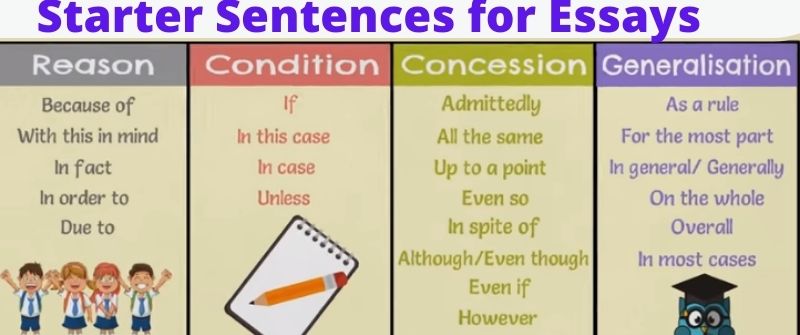
Starter Sentences for Essays
Starter sentences are very important when aiming to write an essay that will guarantee excellent grades. They help your essay to sound good and flow well since they make your work engage more with the writer while making it interesting to read. You might be wondering what I’m talking about.
Well, in simple terms, sentence starters or starter sentences are phrases that are placed at the beginning of a sentence to introduce the content or information that is contained within the sentence. They can also be placed at the start of a paragraph to introduce the paragraph’s content.
While there are various combinations of starter sentences that can be used, it is important to avoid repeating the same combination of words or phrases while starting every sentence. Your essay will be interesting instead of sounding repetitive.

Need Help with your Homework or Essays?
Importance of good essay starters, 1. they bring out richer ideas.
One of the major importance of good essay starters is helping you come up with richer and more nuanced ideas. Without them, you will find that your essays will have a regular habit of containing simple subject-verb sentence structures that are not only uninteresting but also unstimulating to the creative mind.
Good essay starters can stimulate your mind in such a way that you come up with better ideas to support your claims in your academic essays. They also ensure that your work is more refined.
2. Starter sentences Link Ideas
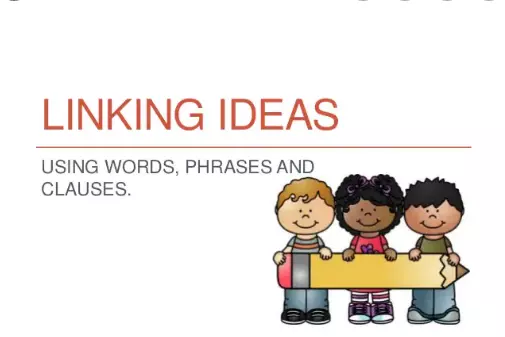
When good essay starters are used, they can help in linking ideas from one paragraph to the other.
They can also aid in transitioning from one section of your essay, let’s say the introduction, to the body paragraphs, and finally to the conclusion.
Good essay starters can act as transitions and sentence-starting phrases that transition from one idea to the next smoothly.
They are capable of linking ideas in such a way that the reader will effortlessly flow with the essay from the start to the end.
3. They increase Credibility and Professionalism
As aforementioned, sentence or essay starters are made up of words that introduce the ideas that will be presented within a sentence, a paragraph, or an entire essay.
As such, those words should be carefully selected so that they can effectively serve their intended purpose of introducing, transitioning, and making the essay more interesting and flowing.
Therefore, if you carefully select the appropriate words to act as essay starters, then your academic paper will sound more professional and credible. If such phrases achieve their intended use, the reader will automatically notice and appreciate your essay.
4. Arouse the Reader’s Attention and Anticipation
Good essay starters will ensure that the reader is attentive throughout the essay. Since you will be using different essay starters in different sections or paragraphs of your essay, it means that their attention will be renewed every time they start reading the next paragraph or section. They will anticipate the information that has been introduced by the essay/sentence starter.
Your readers will be curious and engaged concerning your next claim or argument. Your essay will not be plain and predictable as in the case of essays that lack essay starters.
5. They make Essays Stand Out
When good essay starters are appropriately used, they make your essay stand out from the rest. This is because they make your essay interesting, flowing, professional, and well-researched.
When you are about to make an important point, it is good to use linking and transitional words to start your essay. Your concepts and ideas will be better understood when essay starters are used.
6. Understanding the Content
For those who are reading an essay, good essay starters will help you understand the type of content you are about to read and think about. You can be told to write an essay based on some specific reading.
Essay starters will help you understand the content better so that you can be able to come up with your essay.
7. Helps Simplify Linguistically Complex Ideas
Some essays will require you to tackle complex linguistic ideas. Good essay starters can help simplify such ideas in such a way that you, as a writer, can produce a coherent essay, and the readers can comprehend your claims and arguments.
As such, good essay starters are very instrumental when writing persuasive essays, argumentative essays, analytical essays, and contrast essays. They can be used to analyze/predict, explain, and demonstrate cause and effect.
Tips when Starting Essays
When starting essays, it is important to consider the topic or the subject of your essay and your audience. In writing good essays , one step is starting with an interesting piece that grabs the reader’s read.
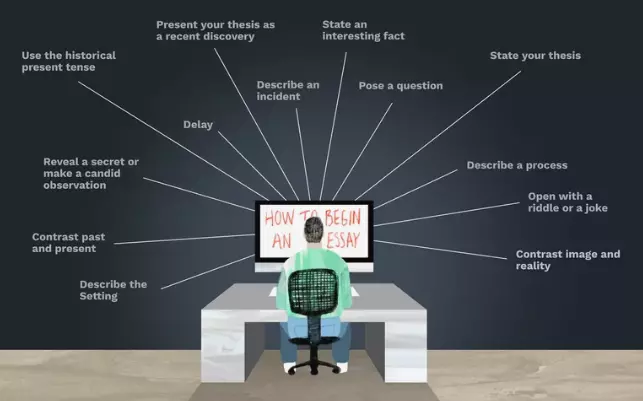
As such, you should first pose a specific question concerning the topic and suggest a correct answer in anticipation of what your audience or readers might respond to.
A strong thesis statement should follow so that you can base your claims and arguments on them.
Your entire essay will be based on the question/answer and the strong thesis statement.
To effectively start an essay, take note of the tips below to deliver a perfect essay introduction.
1. Start with Something Interesting
If you wish to start an essay well, ensure that you share some interesting or shocking facts concerning your topic. Here, you will have to consider your audience’s perspective towards the interesting or shocking fact.
Ensure that the fact is appropriate and relevant to your topic or subject. In our guide on how to write a good paragraph , we explained the importance of such interesting starts because they grab the reader’s attention.
2. Asking a Relevant Question
You can also start your essay by posing a relevant question and immediately answering it. Such a question should be posed in such a way that the readers would want to answer it while still anticipating your answer.
When you immediately answer the question, you invite your audience to consider your response.
3. The Thesis Statement
It is very important to have a strong thesis statement while starting your essay. In most cases, academic papers should have a strong thesis statement in the introduction paragraph.
Some instructors can downgrade you if your essay does not contain a thesis statement in the introduction paragraph.
Once you have identified the thesis statement, place it in the last sentence of the introduction paragraph because the rest of the essay will be based on it. Credible arguments within the body paragraphs will support the claims stated by the thesis statement.
4. Be Descriptive
When starting your essay, dedicate a few sentences to describe things. You can use anecdotes, quotes, and other relevant rhetorical features to make your readers understand what your essay will be discussing.
While doing all this, make sure that you have selected the most intriguing topic. Evaluate all the options given to you by your instructor so that you can define the key purpose of your essay.
Once this is done, study the most appropriate literature and conduct thorough research. Come up with a proper outline. Outlines will help you organize your ideas and thoughts into categories to make your writing process easier.
Get a Brilliant Essay today!
Let our essay writing experts help you get that A in your next essay. Place your order today, and you will enjoy the benefits.
36 Examples of Starter Sentences for Different Essays
The section below will give a number of examples that we think will help you get a direction of what to do. To do that, we have divided these examples into 4 categories; persuasive essays, argumentative, analytical, and contrast essays.
9 Good Examples of Starter Sentences for Persuasive Essays
- In my opinion…
- I’m sure of…
- We all know…
- I feel that…
- We all agree…
- While I agree…
- You must agree that…
Nine Good Starter Sentences for Argumentative Essays
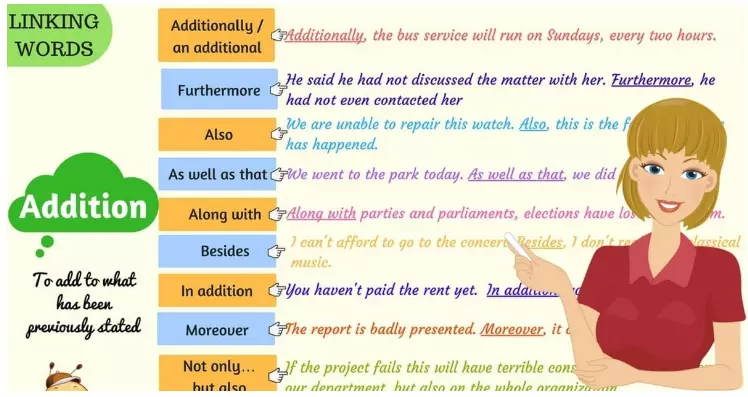
- In addition to…
- For example…
- As well as…
- Furthermore…
- Coupled with…
- Correspondingly…
- One other thing is that…
9 Good Starter Sentences for Analytical Essays
- As a result…
- Accordingly…
- Consequently…
- For this reason….
- This is why…
- As you can see/notice…
- For all of this…
- For all of those reasons…
- Because of/due to the reason that…
9 Good Starter Sentences for Contrast Essays
- In contrast to…
- Nevertheless…
- On the one hand…
- On the contrary…
- Even though this is the case…
- Conversely,
- On the other end,

Josh Jasen or JJ as we fondly call him, is a senior academic editor at Grade Bees in charge of the writing department. When not managing complex essays and academic writing tasks, Josh is busy advising students on how to pass assignments. In his spare time, he loves playing football or walking with his dog around the park.
Related posts
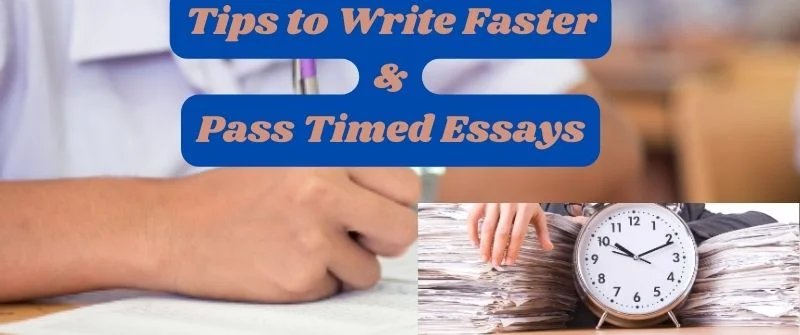
Tips to Write Faster & Pass Timed Essays
How to Write Essays Faster in Exams: Tips to Pass Timed Essays
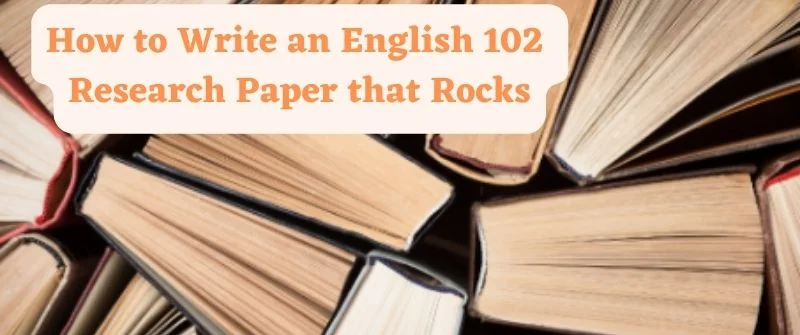
How to Write an English 102 Research Paper that Rocks
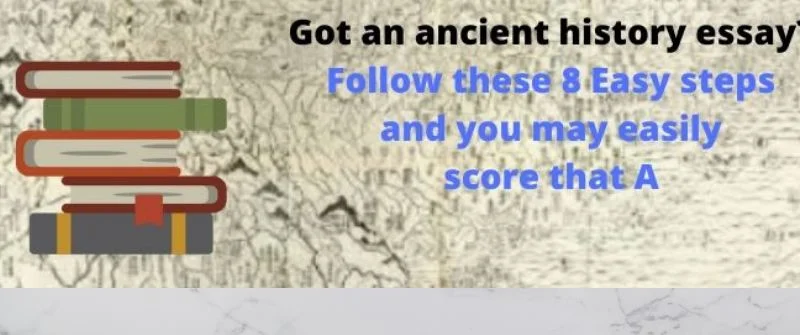
writing ancient history essay
Guide how to Write Good Ancient History Essays

Useful Sentence Starters For Academic Writing
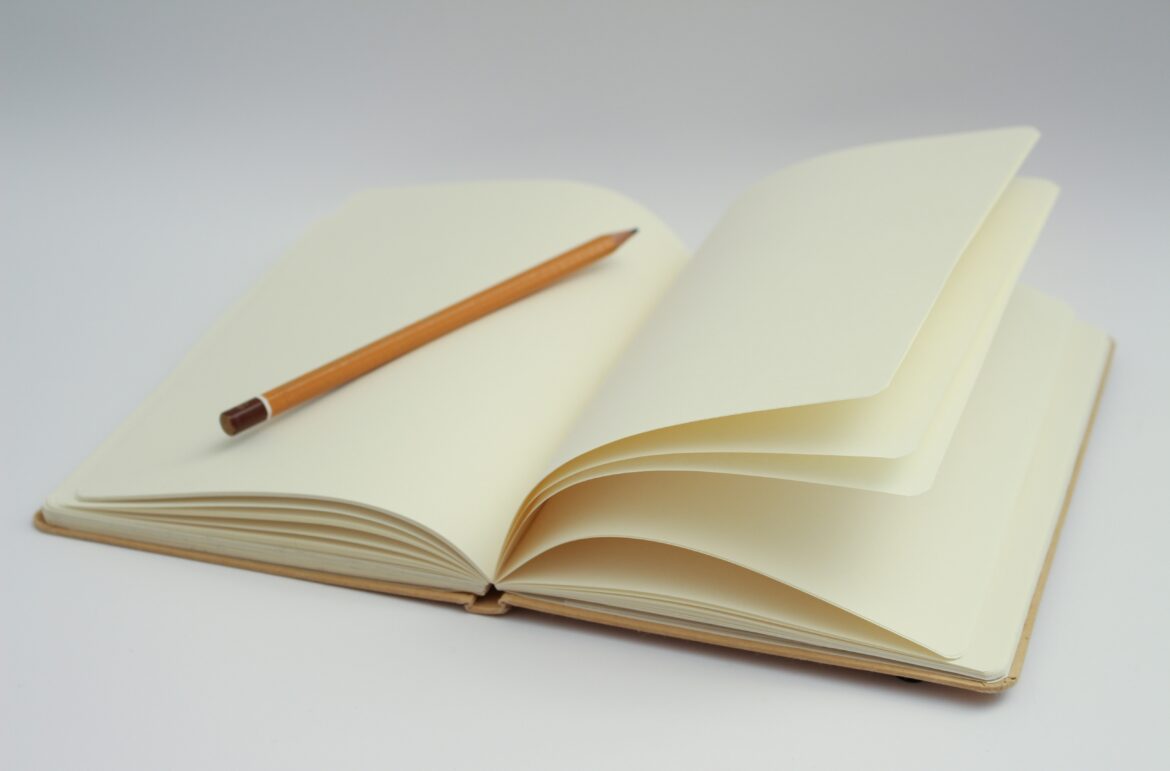
In academic writing, sentence starters play a vital role in organizing your ideas, conveying your arguments effectively, and maintaining a flow throughout your research paper. In this blog post, we will explore various sentence starters that can elevate the quality of your academic writing and provide examples tailored to research-based essays.
Why are sentence starters useful
Sentence starters are particularly helpful in introductions to grab the reader’s attention and provide a clear roadmap for the research essay. They can be employed when introducing a new argument or point, creating a smooth transition between paragraphs, or when emphasizing key ideas. Additionally, sentence starters are beneficial in conclusions to summarize key findings, restate the thesis, and leave a lasting impression on the reader.
Moreover, sentence starters are valuable in comparisons to highlight similarities or differences, in sequences or lists to provide a structured flow of ideas, and in elaboration to expand on points or introduce new evidence. They can also be used to express uncertainty or doubt when discussing conflicting perspectives or limitations in the research. Overall, sentence starters add coherence, clarity, and sophistication to academic writing, making it more compelling and engaging for the reader .
Introduction sentence starters for essays
These sentence starters introduce what the paragraph or entire text is about so the readers know what to expect.
- “This study aims to…”
Example: This study aims to investigate the correlation between social media usage and mental health among teenagers.
- “In recent years, research has shown…”
Example: In recent years, research has shown a growing interest in the potential therapeutic benefits of mindfulness practices.
- “The purpose of this research is to…”
Example: The purpose of this research is to examine the impact of climate change on biodiversity in tropical rainforests.
Conclusion sentence starters
These sentence starters are helpful to hint at the reader that you’re about to wrap things up so they don’t expect any new points or evidence.
- “In conclusion, it is evident that…”
Example: In conclusion, it is evident that the implementation of renewable energy sources is crucial for mitigating the effects of global warming.
- “Based on the findings, it can be concluded that…”
Example: Based on the findings, it can be concluded that regular exercise contributes to improved cognitive function in older adults.
- “Overall, this research sheds light on…”
Example: Overall, this research sheds light on the importance of early intervention programs for children with learning disabilities.
Good sentence starters for comparisons
These sentence starters show that two things are related or alike.
- “Similarly,…”
Example: Similarly, both studies observed a significant decrease in cholesterol levels among participants who followed a Mediterranean diet.
- “In contrast to…”
Example: In contrast to previous research, this study found no significant relationship between caffeine consumption and sleep disturbances.
- “Like X, Y also…”
Example: Like previous studies, this research also highlights the impact of air pollution on respiratory health.
Good sentence starters for sequences or lists
Sentence starters for sequences are used to begin or relate lists of instructions or explaining a series of events.
- “ Firstly, …”
Example: Firstly, the survey gathered demographic information from participants.
- “ Secondly, …”
Example: Secondly, the data analysis involved statistical techniques to identify patterns and trends.
- “Finally, …”
Example: Finally, the study proposed recommendations for future research in this field.
Good sentence starters for elaboration or adding new points
These sentence starters ease the transition from explaining the larger picture to showing examples of minute details.
- “ Moreover, …”
Example: Moreover, this research emphasizes the importance of incorporating ethical considerations in clinical trials.
- “Additionally, …”
Example: Additionally, previous studies have identified socioeconomic factors as influential determinants of educational attainment.
- “Furthermore, …”
Example: Furthermore, the research findings highlight the need for more extensive sample sizes to draw generalizable conclusions.
Good sentence starters to show uncertainty or doubt
These sentence starters help in explaining to the reader that there is an upcoming contrasting idea or thought.
- “ Although the results suggest…”
Example: Although the results suggest a positive correlation, further investigation is warranted to establish a causal relationship.
- “It is plausible that…”
Example: It is plausible that the observed variations in results could be attributed to differences in sample demographics.
- “It remains unclear whether…”
Example: It remains unclear whether the observed changes in behavior are transient or long-lasting.
In conclusion, sentence starters serve as valuable tools in academic writing, enabling you to structure your thoughts, enhance clarity, and guide readers through your research essays. Use them in abundance yet carefully, as they can enhance your quality of writing significantly.
Paperpal is a comprehensive AI writing toolkit that helps students and researchers achieve 2x the writing in half the time. It leverages 21+ years of STM experience and insights from millions of research articles to provide in-depth academic writing, language editing, and submission readiness support to help you write better, faster.
Get accurate academic translations, rewriting support, grammar checks, vocabulary suggestions, and generative AI assistance that delivers human precision at machine speed. Try for free or upgrade to Paperpal Prime starting at US$19 a month to access premium features, including consistency, plagiarism, and 30+ submission readiness checks to help you succeed.
Experience the future of academic writing – Sign up to Paperpal and start writing for free!
Related Reads:
- Using Metaphors in Academic Writing
- How and When to Use ‘then’ vs. ‘than’ [with Examples]
- Travelling or Traveling – Which Word is Correct?
- Proofreading Techniques and Tips for Academic Writing
Paperpal Surpasses 200,000 Users Globally
The difference between british english and american english: a quick guide, you may also like, what is academic editing why is it important , what are citation styles which citation style to..., how to structure an essay, mla works cited page: format, template & examples, powerful academic phrases to improve your essay writing , academic editing: how to self-edit academic text with..., how to use ai to enhance your college..., how to use paperpal to generate emails &..., word choice problems: how to use the right..., how to paraphrase research papers effectively.

IMAGES
VIDEO
COMMENTS
Jun 2, 2022 · Topic sentence starters for essays. Topic sentences are like the sentence starters of an entire essay—they introduce what the paragraph or entire text is about so the readers know what to expect. This paper discusses . . . In this paper . . . Here, we discuss . . . Below, you will find . . . Conclusion sentence starters for essays
Practice Writing Good Sentence Starters with a Custom Edcafe AI Chatbot. Sometimes, the hardest part of writing is getting started. But don’t fret! With this Edcafe AI-created custom chatbot, you can practice creating strong, engaging sentence starters in real time. This chatbot is designed specifically to help you with:
What Is a Good Sentence Starter for a Body Paragraph? Many of the tips I am about to discuss can be used anywhere in a paper, but they are especially helpful when writing body paragraphs. Let’s start with one of the most important types of sentence starter in essay writing: transition words.
Aug 2, 2024 · Practice: Incorporate various sentence starters in your own writing. Feedback: Seek feedback on your use of sentence starters for improvement. Are there any tools or resources to help with using sentence starters? Many online resources offer lists of sentence starters for different purposes (e.g., academic writing, storytelling).
Below, we will explain when sentence starters for essays are used and what types of them exist. We will then give you plenty of examples of sentence-starter words and phrases that you can use in your writing. Note: To learn more about word choice in academic writing, you can read our guide: Words to Use in an Essay. Why you need good sentence ...
Apr 9, 2023 · Words to Start an Introduction Paragraph. The words you choose for starting an essay should establish the context, importance, or conflict of your topic.. The purpose of an introduction is to provide the reader with a clear understanding of the topic, its significance, and the structure of the ensuing discussion or argument.
Jan 3, 2022 · There are countless ways to begin an essay or a thesis effectively. As a start, here are 36 introductory strategies accompanied by examples from a wide range of professional writers. 36 Engaging opening sentences for an essay. 1. “Is it possible to be truly anonymous online?”
Oct 30, 2024 · It will depend greatly on the type of sentence that you are writing as to which sentence starter you use and using a good variety within your essay will make it much more engaging for the reader. Once you have finished writing, it is a good idea to go back over your work and check that your sentence starters make sense and are being used correctly.
Nov 4, 2023 · 36 Examples of Starter Sentences for Different Essays . The section below will give a number of examples that we think will help you get a direction of what to do. To do that, we have divided these examples into 4 categories; persuasive essays, argumentative, analytical, and contrast essays. 9 Good Examples of Starter Sentences for Persuasive ...
Jun 8, 2023 · Overall, sentence starters add coherence, clarity, and sophistication to academic writing, making it more compelling and engaging for the reader. Introduction sentence starters for essays. These sentence starters introduce what the paragraph or entire text is about so the readers know what to expect. “This study aims to…”